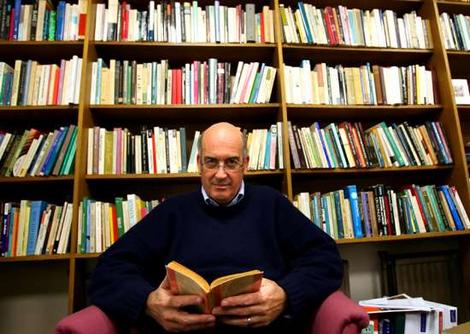
September 28, 2007
more rocking on
Posted by dogpossum on September 28, 2007 4:08 PM in the category teaching

It's no secret that I think the F-bomb is the fushiz, and browsing the internet today (mostly looking for answers for students who've asked me "are there any other easy things we can read about media?" - they're sick of hearing me talk about the Media Report and so am I) I came across this article "Literature, Culture, Mirrors:John Frow responds to Simon During" in the Australian Humanities Review by the Man.
I've been thinking about the role of literature - or books - in cultural studies lately. Mostly, I try not to think about the 'boundaries' between media studies, cultural studies, book studies and (now) communications studies. They seem to be set down, for the most part, by the funding structures and course requirements of university departments and faculties and otherwise really don't seem very useful for most of us who are actually in there getting jiggy with kultchah.
But I'd been wondering how to talk about books in a cultural studies context. One of the clearest differences in the way I think about books when I'm wearing my cultural/media studies hat(s) as opposed to the way I thought about books when I was enrolled in an English department doing 'literature' subjects,* is to do with audiences. I know there've probably been some changes in English departments since I got all into the Screen Studies (that's what we called it in the olden days), but I've noticed that I think about books in terms of the relationship between audiences and textual structure rather than thinking about books as little boxes of words, standing alone there between their covers on the shelf. So while I can get all "oh, I just love blahblah author", I'm actually far more interested in what people do with blahblah author's work once they get ahold of the words.
So, for example, I've been thinking about writing a paper for a symposium being held as part of swancon. I'd like to write about watching HBO's Big Love's representation of patriarchal polygamy while reading about Karen Traviss's matriarchal polygamies in the City of Pearl books. For me, it's interesting to think about the way we SF fans aren't just consuming a solid diet of SF - we read across the genre lines. And the way I think about polygamy, humanity, gender and society have been inflected by both these texts while I'm reading them both....which of course makes me want to talk about TV programming, book publishing seasons and structures of consumption, but that would be (yet another example of) digression...
This point was brought home to me the other day listening to a colleague's very interesting paper on Scifi.com. She noted that there'd been some resentment from hardcore SF fan Scifi.com audiences about the introduction of 'un-SF' in the Scifi.com programming. Apparently they weren't impressed by the wrestling shows**. Now, I'm interested in the gender implications at work there (particularly as a fair old swag - if not the vast bulk - of SF telly involves fighting, violence, warfare and plain old fisticuffs), but I'm more interested in the insistence that hardcore SF fans want only to watch SF on telly. Of course, if I were paying for an SF channel, I think I'd be after a fulfilment of my expectations - SF 24/7 YES! - but at the same time...
So I was wondering how I would go about thinking and writing about literature in a cultural studies context. I don't particularly want to go down the fan studies track again. Yes, yes, we all know SF fans read SF books, watch SF films and telly, play SF games and party in online SF communities. But what happens when we talk about women reading those interesting romance/SF hybrid books? That's my other pet interest at the moment - is anyone else writing about these books at the moment (not counting my posts)? And I'm definitely not interested in getting bogged down in discussions about 'quality' lit - if it's a book, it's literature to me, mate.
But anyway, back to JF. My interest was caught by this bit:
Let me offer two reasons why cultural studies has the potential to change departments of literary studies for the better. The first is that it forces students to come to terms with different regimes of value, different and perhaps incommensurate valuing processes and their relation to social forces and social positions. It shifts the interpretive gaze from a self-contained text to its discursive and social framings, within which students are themselves implicated; while at the same time it opens a potentially fruitful methodological exchange between the distinct protocols of interpretation that apply in the social sciences and the textual disciplines. The second reason has to do with process. Cultural studies supposes a pedagogy in which students are at least as fully in control of much of the subject matter as are the teachers. This isn't the end of teacherly authority, but it does transform the learning process by challenging teachers to redefine what it is that they do in a classroom, and by involving students - in a quite orthodox Socratic manner - in the understanding and analysis of what they already know. In neither of these respects is cultural studies the enemy of literary studies; the two perhaps work best when they coexist in tension and exchange; but literary studies will not survive if it is taught as a form of religion.
That second bit is the bit I'm most interested in:
Cultural studies supposes a pedagogy in which students are at least as fully in control of much of the subject matter as are the teachers.
It's the sort of argument that makes a great deal of sense to me when I think about teaching magazines/tabloids this semester. I never read magazines, but for the occasional copy of Nature (the glossy one), or the odd gardening or cooking mag. I don't watch enough commercial telly to recognise the TV stars and I have absolutely no idea about mainstream, popular music. I was largely teaching this unit in reference to academic reading and a few weeks' panicky hunter-gathering online and at the supermarket checkout (the latter proving most challenging for a hippy who likes indy grocery shops).
So while I could present the ideas to the students as academic concepts, drawing largely on my own enthusiasm for news values and news papers (hell, it's all print media to me), we were largely relying on their specialist knowledge of and familiarity with magazines. This offered interesting moments in the tutorials, which are (of course) ten quarters female. Female students who hadn't said a word all semester were suddenly contributing with enthusiasm. And these chicks really are magazine gurus - they read anywhere from one a week to a dozen a week. And they're intimately familiar with the complex relationship networks which are the stock in trade of these publications.
At first we had to deal with the (mostly male) students' disparagement of 'trash media'. I made the point that reading these things - and making any sense of them whatsoever - required an intimate and extensive knowledge of the personalities, events and mode of discourse. We'd already talked about why tabloids are more popular than broadsheet media the week before, and they'd mentioned that 'it's too hard to understand what they're talking about - the middle east is too complicated for just half an hour of news'. And I pointed out that while they mightn't be prepared to unravel the middle east, they were prepared to wade into Britney's social network - equally complex and foreign. Which of course led us them to the idea that personalisation is a really effective way of creating news value - making a story marketable for a wide audience.
But it was mostly an interesting exercise in the sort of stuff JF is talking about in that bit of the essay. For me, as a bub teacher, it can be both absolutely thrilling and exciting, but also terrifying. I spend most of my time worrying that I'm telling the stoods a big line of bullshit - one day someone's going to figure out that I'm full of shit. I learnt in the very first tutorial that if you lie and pretend you know the answer to something - if you really do try and make up a bullshit answer - they'll figure it out and you'll look like a dickhead. So I'm all for admitting ignorance: "I dunno. I haven't read that stuff. I'm into blahblah. But I do know blahblah writes about it. What do you guys know? What do you think?" I've found they're actually far more willing to speculate and expore ideas when they've heard me admitting complete ignorance, but still being prepared to have a bash at figuring out an answer.
But I really like this approach to teaching - the postioning of students as specialists. And then working with them to apply the ideas from readings or lectures to explore (as JF puts it) "involving students ...in the understanding and analysis of what they already know". This was a truly fabulous approach in a media audiences subject I taught last year.
The first piece of assessment was a lit review, where the stoods chose a media audience (ie an audience of a particular media text or form) and then figured out who'd already written about it, or which bits of research could help them research their audience. The second bit of assessment involved planning a media audience research project (each week of lectures explored a different research method). It was fabulous to teach because the assessment worked cumulatively - you were building on their knowledge. The stoods dug it because they began to feel like proper media researchers - specialists with a body of knowledge and skills under their belt.
I also used tutorials to discuss media and their media interests. I encouraged them to think about the media they were into, and then as we began working on the assessment, to talk through their ideas about the research. Because we were all reading the same literature and most of us knew the media they were discussing, we could all comment and discuss the topic knowledgeably. I've found that this is the most important part of teaching stoods - encouraging a confidence in their own skills and knowledge. Encouraging them to trust their ideas and instincts. I mean, why not? They really, truly know things that we old sticks don't - they haven't read the academic literature, but they're hard core media consumers. And they are engaged in really complex and interesting media - cross-media - consumption and use. So why not get them using those skills and ideas?
But this approach was really nice for the students - they really felt a sense of 'ownership' of their projects (and I used that term - our projects) and a confidence in their ideas. And they did produce some really interesting work. And man, it rocked to teach because they gave a shit and actually got excited about the assessment and readings.
I'm not sure how I got to this point, and I know this is a confusing post, but I guess this is meant to be a story about disciplinarity, about teaching practices, about methodology cross-discipline, and just another fan-atic post about your hero and mine, the Frowstah:

*I'm really sorry about this terrible sentence. I have been marking essays full of this rubbish and really can't remember how to write any more. Perhaps I need to read more bewks?
** Frankly, it makes perfect sense to me - what could be more fantasy, speculative ficationesque than WWF?




